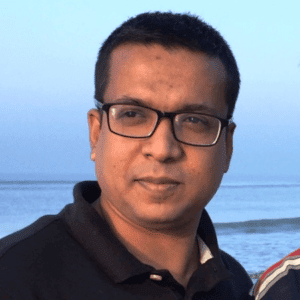Smart Cards are increasing health access for the urban extreme poor in Bangladesh
 By Xueyuan Deng, Key Correspondent for the Irish Global Health Network
By Xueyuan Deng, Key Correspondent for the Irish Global Health Network
Speaking at the 2019 Global Health Exchange Conference in Dublin, Md. Mosarouf Hossain, Programme Manager of PROSHOMON (Promoting Sustainable Health and Nutrition Opportunities for Marginalized Urban Extreme Poor Population) at Concern Worldwide, talked about a strategy to help the urban extreme poor in Bangladesh get access to healthcare services via digital health technology.
There is a gap between the high medical demands of people who live in the major cities and the capacity of the current primary healthcare delivery system. In Bangladesh, the Ministry of Health and Family Welfare has a responsibility to provide primary healthcare in rural areas, and the local governments are responsible for delivering healthcare services within cities. The process of urbanisation in Bangladesh is accelerating: Mr. Hossain stated that more than half of Bangladesh’s population will live in urban areas by 2050. However, this will add more burden to the local government in providing healthcare services due to their limited resources.
Among the huge populations of cities, there is a special group which requires more attention — those living a life of extreme poverty. Compared with middle-income and wealthy individuals, the extremely-poor do not receive socioeconomic priority regarding the development of healthcare facilities, and extra efforts must be made to ensure that their rights to access healthcare services are fulfilled.
Mr. Hossain showed data from a baseline survey in Chandpur and Feni municipalities. Only 47% of participants used to seek services from an accredited health facility and 43% of mothers received a prenatal care visit within two days, while all the participants reported that the high cost of healthcare services was a barrier for them. Neither Chandpur nor Feni had a healthcare plan for extremely poor people living in urban areas.
Based on the above situation, Concern Worldwide launched a programme with support from the European Union, which adopted a digital health approach to help the extremely poor population in Bangladesh to get access to healthcare facilities. The project will run until 2021, and employs a well-designed and effective smart card, based on a healthcare voucher scheme. Healthcare facilities can manage the information of patients and the transaction process through an online management system.
This project aims to support 40,763 extremely poor people who are not covered by any other free health cards. It will enable them to access a free package of health, nutrition and family planning services in Feni and Chandpur. Special attention will be provided to women-headed households, the elderly, people with disabilities and socially and professionally marginalised groups. The cards are valid for one year and end users can receive free healthcare services until their yearly allocation of funds is fully used. The users will be assessed each year to check if they still meet the eligibility criteria. The provided services include doctor consultations, antenatal care, normal deliveries, reproductive healthcare, adolescent healthcare and primary eye healthcare, among others. To date, five recognised private health facilities are accepting the smart cards.
There are several advantages to using this smart card: Firstly, it is a cashless system and is convenient for patients to just bring one card to pay for healthcare services. Secondly, patients’ records can be saved in the management system and they will have their own up-to-date electric medical records. Thirdly, the whole process is paperless, saving both money and time.
In future, if public hospitals in Bangladesh could join in the programme or build strategies to assist the urban extremely poor population, the situation could be further improved. Moreover, the gains made by the programme could be enhanced by supportive policies created by local government.
19 September 2019
CATEGORIES
- Restore Humanity Campaign
- Equity in Action Blog
- Training Programmes
- Sponsorship
- Vaccine Equity
- Get Global – Global Health Talks
- Student Outreach Team
- Get Global Young Professionals Talk Global Health
- Global Health Matters – Live Event Series
- Global Health Matters – IGHN Live Event Series
- An initiative of Irish Global Health Network
- ESTHER Ireland and ESTHER Alliance for Global Health Partnerships
- Global Health Matters – Webinar Series
- ESTHER
- IGHN Conferences
- Global Health Conference 2020
- Women in Global Health – Ireland Chapter
- ESTHER Partnerships
- Weekly Webinar Series
- 4th Global Forum on HRH
- Access to Medicines
- Archive Page Weekly COVID Webinars
- Clean Cooking 2019
- Climate Change and Health Conference 2017
- Conference Abstracts
- Conference Materials
- Covid FAQ
- COVID Funding Opportunities
- COVID-19
- COVID-19: Gender Resources
- Dashboard and online resources
- Education
- ESTHER Alliance
- Events
- Events & News
- Funding covid
- Global Health Exchange 2018
- Global Health Exchange 2019
- Global Health symposium 2019
- Health Workforce/HRH
- Homepage Featured
- Homepage recent posts
- IFGH 2011-2012 Conference and Events
- IFGH 2014 Conference
- IFGH Multimedia
- Irish AIDS Day 2017
- Irish News and Feeds
- Key Correspondent Articles
- Key Correspondent News
- Maternal Health
- Multimedia
- News
- News & Events
- Newsletter
- Opportunity
- Our LMIC's Resources for COVID19
- Partner Country News and Feeds
- Past Events
- Policy
- Presentations
- Recurring events
- Reports & Publications
- Research
- Resources
- Student Outreach Group
- Students Corner
- TEDTalks
- TRAINING COURSES FOR HEALTH CARE PROFESSIONALS
- Uncategorized
- Upcoming Events
RECENT POSTS

Impact testimonies- Lombani

Impact Testimony – Shadrick

Power, Inequality, Decolonisation – and Living My Recovery By Bronwyn April

Global Health Without Borders: Reflections on the Power of Diverse Voices

IGHNxEU – Empowering Women for a Healthier Europe


 By Xueyuan Deng, Key Correspondent for the Irish Global Health Network
By Xueyuan Deng, Key Correspondent for the Irish Global Health Network